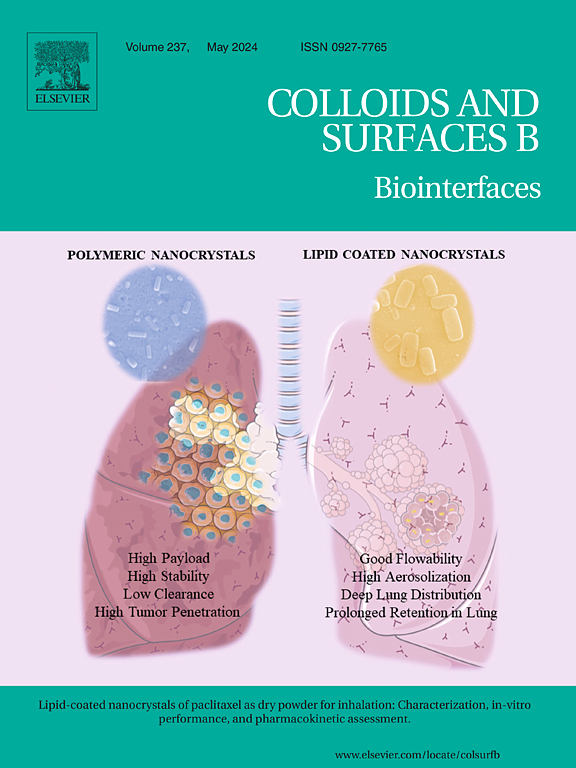Endometrial regenerative cell exosome-derived Sirtuin 6 alleviates ulcerative colitis by remodeling macrophage polarization
IF 5.6
2区 医学
Q1 BIOPHYSICS
引用次数: 0
Abstract
Macrophage dysregulation is a feature of ulcerative colitis (UC), a chronic inflammatory bowel disease (IBD). Exosomes generated from endometrial regenerative cells (ERCs) (ERC-Exos) may influence the immunological dysfunction associated with IBD. In immunological diseases, Sirtuin 6 (SIRT6) reduces NF-κB signalling due to its protective benefits. Building on these findings, this study investigates the function and mechanism of SIRT6 derived from ERC-Exos in mediating the relief of UC. Lentiviral transduction was used to achieve SIRT6-specific knockdown ERC-Exos (SIRT6-KD-ERC-Exos). Dextran sulphate sodium (DSS)-induced ulcerative colitis in mice was categorized into untreated (PBS control), ERC-Exo-treated, and SIRT6-KD-ERC-Exo-treated groups. Compared with the untreated group, ERC-Exo treatment significantly alleviated UC-caused weight loss, bloody stools, shortening of colon length, and pathological damage. Additionally, serum cytokine levels of IL-10 and TGF-β were increased, while IL-6 and TNF-α levels were decreased. Both in the spleen and the mesenteric lymph nodes, we discovered that ERC-Exos increased M2 macrophage polarisation and decreased M1 polarisation. However, when SIRT6 was knocked down in ERC-Exos, the protective effects were compromised. Additionally, SIRT6 in ERC-Exos reduced the number of M1-polarized macrophages by blocking the NF-κB signalling pathway. This research identifies exosomal SIRT6 derived from ERCs as a potent target for modulating macrophage polarization, underscoring a promising acellular therapeutic approach for inflammatory bowel disease.
子宫内膜再生细胞外泌体衍生的Sirtuin 6通过重塑巨噬细胞极化减轻溃疡性结肠炎
巨噬细胞失调是溃疡性结肠炎(UC)的一个特征,UC是一种慢性炎症性肠病(IBD)。子宫内膜再生细胞(ERC-Exos)产生的外泌体可能影响与IBD相关的免疫功能障碍。在免疫性疾病中,Sirtuin 6 (SIRT6)由于其保护作用而降低NF-κB信号传导。基于这些发现,本研究探讨了ERC-Exos衍生的SIRT6介导UC缓解的功能和机制。使用慢病毒转导实现sirt6特异性敲低ERC-Exos (SIRT6-KD-ERC-Exos)。葡聚糖硫酸钠(DSS)诱导的小鼠溃疡性结肠炎分为未治疗组(PBS对照组)、erc - exo治疗组和sirt6 - kd - erc - exo治疗组。与未治疗组相比,ERC-Exo治疗组明显减轻了uc引起的体重减轻、血便、结肠长度缩短和病理损伤。血清细胞因子IL-10、TGF-β水平升高,IL-6、TNF-α水平降低。在脾脏和肠系膜淋巴结中,我们发现ERC-Exos增加了M2巨噬细胞的极化,降低了M1的极化。然而,当SIRT6在ERC-Exos中被敲除时,保护作用就会受到损害。此外,ERC-Exos中的SIRT6通过阻断NF-κB信号通路减少了m1极化巨噬细胞的数量。本研究确定来自ERCs的外泌体SIRT6是调节巨噬细胞极化的有效靶点,强调了炎症性肠病的非细胞治疗方法的前景。
本文章由计算机程序翻译,如有差异,请以英文原文为准。
求助全文
约1分钟内获得全文
求助全文
来源期刊

Colloids and Surfaces B: Biointerfaces
生物-材料科学:生物材料
CiteScore
11.10
自引率
3.40%
发文量
730
审稿时长
42 days
期刊介绍:
Colloids and Surfaces B: Biointerfaces is an international journal devoted to fundamental and applied research on colloid and interfacial phenomena in relation to systems of biological origin, having particular relevance to the medical, pharmaceutical, biotechnological, food and cosmetic fields.
Submissions that: (1) deal solely with biological phenomena and do not describe the physico-chemical or colloid-chemical background and/or mechanism of the phenomena, and (2) deal solely with colloid/interfacial phenomena and do not have appropriate biological content or relevance, are outside the scope of the journal and will not be considered for publication.
The journal publishes regular research papers, reviews, short communications and invited perspective articles, called BioInterface Perspectives. The BioInterface Perspective provide researchers the opportunity to review their own work, as well as provide insight into the work of others that inspired and influenced the author. Regular articles should have a maximum total length of 6,000 words. In addition, a (combined) maximum of 8 normal-sized figures and/or tables is allowed (so for instance 3 tables and 5 figures). For multiple-panel figures each set of two panels equates to one figure. Short communications should not exceed half of the above. It is required to give on the article cover page a short statistical summary of the article listing the total number of words and tables/figures.
 求助内容:
求助内容: 应助结果提醒方式:
应助结果提醒方式:


